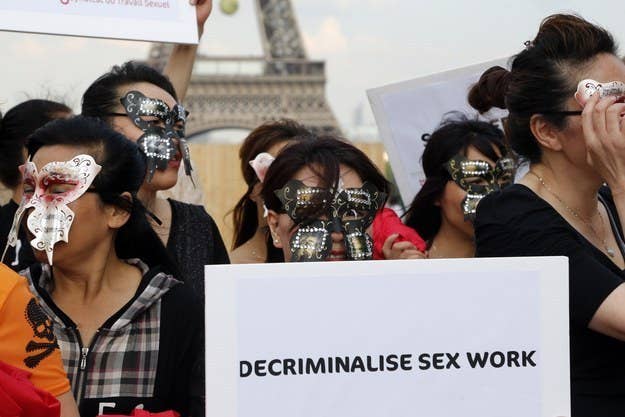
One of the biggest global human rights organizations voted on Tuesday to advocate for decriminalizing the buying and selling of sex, in a controversial measure that seeks "to defend sex workers' human rights and lessen the risk of abuse and violations they face."
Amnesty International's global secretariat approved the measure today, after nearly two weeks of backlash from celebrities and some women's rights groups.
Actors Meryl Streep, Kate Winslet, and Lena Dunham and women's rights activist Gloria Steinem signed a letter protesting the proposed policy, and a related petition received more than 8,000 signatures.
Taina Bien-Aimé, executive director of the Coalition Against Trafficking in Women, called a "yes" vote "a slap in the face" to human rights. She and other opponents say the policy violates international human rights protocols and will increase the risk of trafficking for women.
The vote has "thrown women and girls under the bus, basically saying that gender apartheid is important for the sex trade," she said.
Amnesty's vote follows two years of consultations with its country offices around the world and the organization's own research on the effects of criminalization in Norway, Hong Kong, Argentina, and Papua New Guinea. A draft version of the policy, leaked several weeks ago and the basis for Tuesday's vote, said that "criminalisation, in its varying forms, exposes sex workers to increased risk of human rights abuses."
The vote brings Amnesty's policies in line with other major international organizations, including Human Rights Watch, the Open Society Foundation, the World Health Organization, and the Joint United Nations Programme on HIV/AIDS. These and other groups argue that criminalizing the buying and selling of sex entrenches the risk of physical violence and health threats, including HIV, for sex workers.
The Lancet, a major international medical journal, on Monday released an editorial supporting the proposed Amnesty policy, grounding its support in a Lancet study from last year that found decriminalization could spare 33–46% of HIV infections expected in the next decade.
"Criminalizing any part of the sexual transaction only drives people further underground," said Juhu Thukal, a member of the steering committee of the New York Anti-Trafficking Network, and a supporter of Amnesty's policy. Thukal says that can make sex work even more unsafe by undermining sex workers' freedom to communicate and collaborate to keep each other safe.
Europe has lately opted for a kind of "middle path," legalizing the selling of sex but criminalizing its purchase. Women's advocates in Sweden, which pioneered the model in the mid-1990s, say this kind of arrangement moves the stigma of transactional sex from female sellers onto male buyers. They also contend that fining or prosecuting buyers helps decrease the demand for transactional sex.
But recent research suggests the "Nordic model," as Sweden's laws have come to be known, isn't as effective as its supporters first hoped. A recent Swedish government review found that street prostitution has dropped by half, but internet advertisements for "escort services" — which are used as a proxy estimate for rates of sex buying or selling online — have jumped by nearly 200%.
Amnesty opponents argue that decriminalization risks an increase in trafficking. As examples, they point to Germany and the Netherlands. Both countries permit buying and selling sex, and both have high rates of human trafficking. Supporters, however, point out that trafficking statistics are spotty, and there's no clear study proving that one problem is actually causing the other.
"Amnesty International considers human trafficking abhorrent in all of its forms, including sexual exploitation, and should be criminalized as a matter of international law. This is explicit in this new policy and all of Amnesty International's work," the organization said in a statement announcing the vote.
Some sex workers themselves say that concentrating on trafficking and other abuses misses the point. "I and just about every other sex worker activist I know will acknowledge there are human rights violations in the adult industry, but there are also human rights violations in agriculture, construction, the chocolate industry," said Savannah Sly, a board member of the Sex Worker Outreach Project, which is based in California. "We don't try to abolish the construction trade or abolish the chocolate industry. We set up fair trade [and] give workers legal recourse when abused by bad management."
Members of organizations like Sly's, or the Global Network of Sex Workers, speak in the language of labor rights, and many talk about sex work as a personal choice. But Esohe Aghatise, who runs the anti-trafficking program at Equality Now, a global gender rights organization headquartered in London, said those views are overrepresented.
"In any democratic system, or in any system that works, we look at an interest of a great majority against a tiny minority," said Aghatise. "There is a very, very small minority that insist they make choices. OK, we recognize that. But we are saying it's a greater majority of those cases where there is no question of choice at all that should be the overriding factor on which we base any policy."
Even though many other organizations already have analogous policies, Aghatise said the Amnesty vote is significant.
"Amnesty International is about the biggest and most important and influential human rights organization in the world," she said. "When Amnesty International speaks, the whole world stops to listen."
